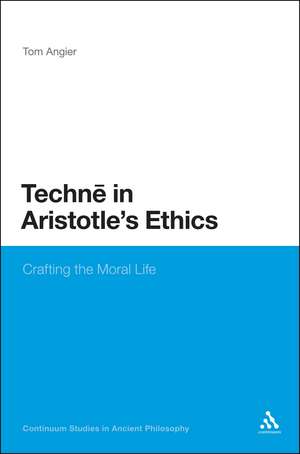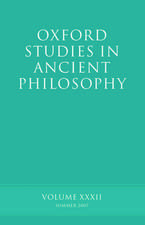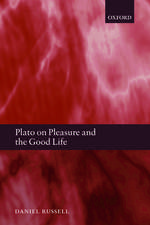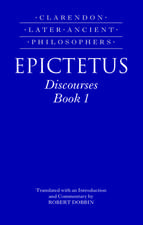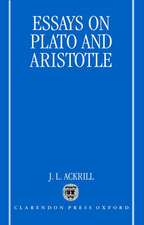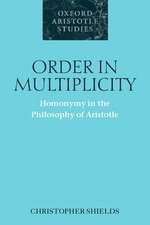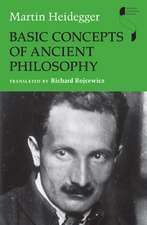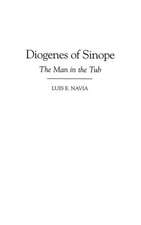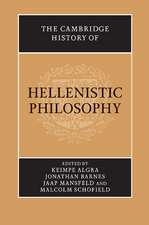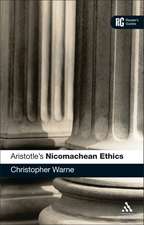Techne in Aristotle's Ethics: Crafting the Moral Life: Continuum Studies in Ancient Philosophy
Autor Dr Tom Angieren Limba Engleză Paperback – 26 aug 2012
| Toate formatele și edițiile | Preț | Express |
|---|---|---|
| Paperback (1) | 255.66 lei 6-8 săpt. | |
| Bloomsbury Publishing – 26 aug 2012 | 255.66 lei 6-8 săpt. | |
| Hardback (1) | 889.23 lei 6-8 săpt. | |
| Bloomsbury Publishing – dec 2010 | 889.23 lei 6-8 săpt. |
Din seria Continuum Studies in Ancient Philosophy
- 22%
 Preț: 256.59 lei
Preț: 256.59 lei - 22%
 Preț: 1005.41 lei
Preț: 1005.41 lei - 22%
 Preț: 883.86 lei
Preț: 883.86 lei - 22%
 Preț: 897.55 lei
Preț: 897.55 lei - 23%
 Preț: 236.19 lei
Preț: 236.19 lei - 22%
 Preț: 888.81 lei
Preț: 888.81 lei - 31%
 Preț: 949.08 lei
Preț: 949.08 lei - 31%
 Preț: 891.18 lei
Preț: 891.18 lei - 22%
 Preț: 947.11 lei
Preț: 947.11 lei - 23%
 Preț: 255.19 lei
Preț: 255.19 lei -
 Preț: 255.66 lei
Preț: 255.66 lei - 22%
 Preț: 889.88 lei
Preț: 889.88 lei -
 Preț: 255.11 lei
Preț: 255.11 lei -
 Preț: 256.38 lei
Preț: 256.38 lei -
 Preț: 256.02 lei
Preț: 256.02 lei -
 Preț: 256.85 lei
Preț: 256.85 lei -
 Preț: 255.66 lei
Preț: 255.66 lei - 14%
 Preț: 889.97 lei
Preț: 889.97 lei -
 Preț: 257.12 lei
Preț: 257.12 lei - 14%
 Preț: 946.72 lei
Preț: 946.72 lei
Preț: 255.66 lei
Nou
Puncte Express: 383
Preț estimativ în valută:
48.92€ • 53.31$ • 41.22£
48.92€ • 53.31$ • 41.22£
Carte tipărită la comandă
Livrare economică 23 aprilie-07 mai
Preluare comenzi: 021 569.72.76
Specificații
ISBN-13: 9781441175144
ISBN-10: 1441175148
Pagini: 192
Dimensiuni: 156 x 234 x 10 mm
Greutate: 0.27 kg
Editura: Bloomsbury Publishing
Colecția Continuum
Seria Continuum Studies in Ancient Philosophy
Locul publicării:London, United Kingdom
ISBN-10: 1441175148
Pagini: 192
Dimensiuni: 156 x 234 x 10 mm
Greutate: 0.27 kg
Editura: Bloomsbury Publishing
Colecția Continuum
Seria Continuum Studies in Ancient Philosophy
Locul publicării:London, United Kingdom
Caracteristici
Places Aristotle's Ethics in its Platonic and pre-Platonic intellectual and historical context.
Notă biografică
Tom Angier is Lecturer in Philosophy at the University of Kent, Canterbury, UK.
Cuprins
AbbreviationsPrefaceIntroduction: Techne in pre-Platonic Greek Thought1. Techne in the Platonic dialogues2. Aristotle reacts to his inheritance3. Ergon: The Function Argument4. Mesotes: Aristotle's Ethical Mean5. Ethismos: Aristotle's Theory of HabituationConclusionAppendixBibliographyIndex
Recenzii
Angier's rigorous defence of the centrality of craft models and metaphors in Aristotle's ethics is a significant contribution to Aristotelian scholarship with which we would do well to engage.
By identifying the extent to which Aristotle's thinking about ethics was shaped by notions drawn from the crafts Angier has thrown new light on a surprising number of topics and has deepened our understanding of tensions within Aristotle's thought. It is by now a rare achievement to have said something new, true and important about Aristotle.
Sharp in its argumentation and impressively conversant with secondary literature. It is well written and clear. Even where the reader does not agree with the conclusions defended, he or she should still profit from the challenge of the book's reasoning and its conversance with Aristotle's difficult text. That Aristotle's reflection upon the arts shapes his ethical thought quite as much as Angier proposes is unlikely, but nonetheless the case is energetically and skilfully made.
By identifying the extent to which Aristotle's thinking about ethics was shaped by notions drawn from the crafts Angier has thrown new light on a surprising number of topics and has deepened our understanding of tensions within Aristotle's thought. It is by now a rare achievement to have said something new, true and important about Aristotle.
Sharp in its argumentation and impressively conversant with secondary literature. It is well written and clear. Even where the reader does not agree with the conclusions defended, he or she should still profit from the challenge of the book's reasoning and its conversance with Aristotle's difficult text. That Aristotle's reflection upon the arts shapes his ethical thought quite as much as Angier proposes is unlikely, but nonetheless the case is energetically and skilfully made.
